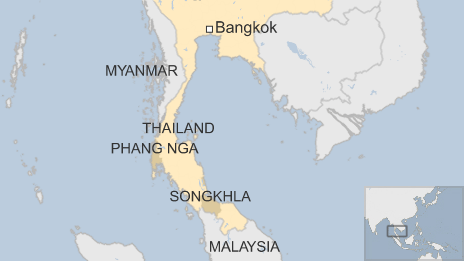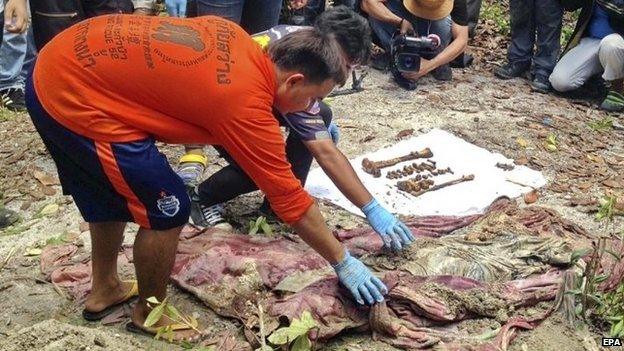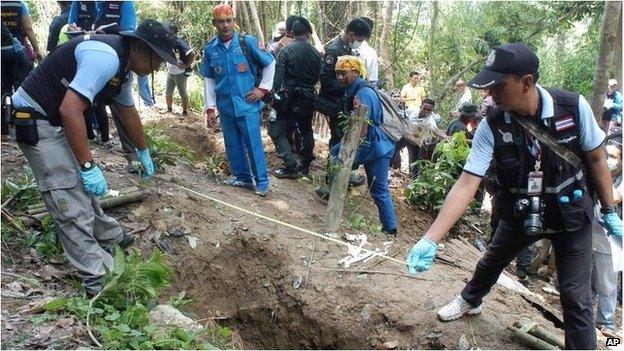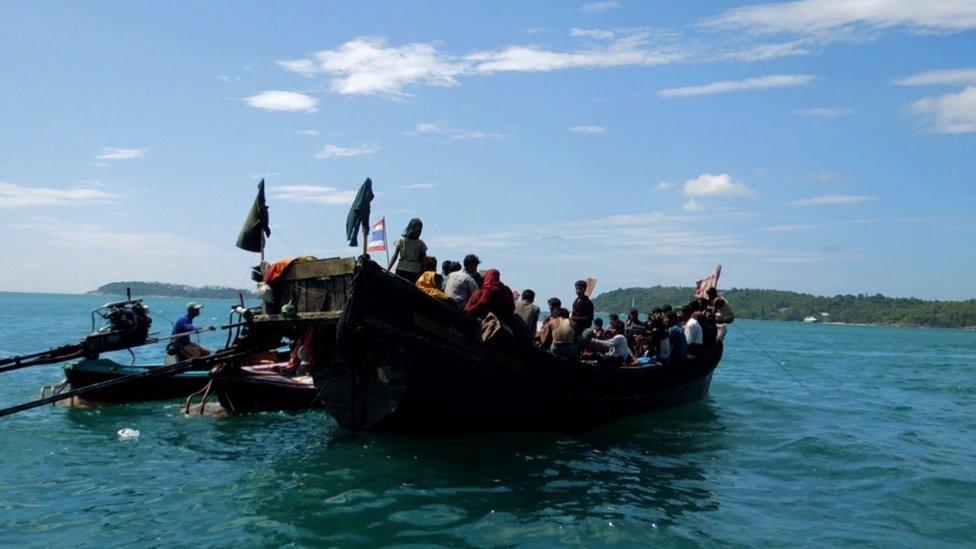Thailand graves: Two skeletons found at camps in Phang Nga
- Published
Catherina Moh reports as authorities in Thailand find two skeletons in Phang Nga
Thai officials say they have found two skeletons possibly linked to people smuggling, days after the discovery of 26 bodies in a mass grave.
Both skeletons were found in abandoned camps in Phang Nga province, the local governor said. One was tied to a tree.
Phang Nga is several hundred kilometres away from the site in Songkhla province where 26 bodies were found last week.
Three Thais and a Burmese national have been arrested in Thailand on suspicion of human trafficking.
The mass grave containing 26 bodies was discovered in an abandoned jungle camp close to the Malaysian border - an area regularly used by people-smugglers.
Separately, a second camp with at least another five graves has been found in Songkhla province, officials said on Tuesday.
The area is on a route regularly used by Rohingya Muslims fleeing persecution in Myanmar (formerly known as Burma).

Officials believe would-be migrants are held in the camps by traffickers who demand ransoms from their families.
'Official complicity'
Thailand has been strongly criticised for failing to act against trafficking networks, which typically hold thousands of people from Myanmar and Bangladesh every year for ransom, the BBC's Jonathan Head reports from Phang Nga.

The two skeletons were found in abandoned camps in Phang Nga province
Police said the Thais arrested on Monday included one local council member from Songkhla province and two village officials.
Rights groups have long alleged that officials and local police are aware of, or complicit in, the trade.

At the scene: BBC's Jonathan Head, Phang Nga
I had been in these mangrove swamps before, looking for the camps where distraught Rohingyas and Bangladeshis told us they had been held in dreadful conditions. Now we were back to find out who had not survived.
On another island, scattered human bones lay under the mangrove roots on the beach. There were clear signs large numbers of people had lived here - rusting food cans, mouldering shoes and threadbare tarpaulins.
The Thai authorities have known about these camps for years.
Local communities are paid off to keep quiet, or their young men employed as guards. Police and other officials get their cut of a business where traffickers pay $20,000 (£13,160) or more for a boatload of migrants, then try to recoup the cost by demanding big ransoms from their families.
Those who cannot pay are kept, and often terribly abused or killed. Last year a senior police officer told me about a huge transit camp right on the Malaysian border.
But they could not move against it - the area was controlled by the army, he said.
Thailand has a military government. If they really want to show serious purpose in shutting down the trade, they will have to take action against people in their own ranks.

The Burmese national was named as Soe Naing, known as Anwar. He was a "central figure who ran camps and sought ransoms", deputy police commander Anuchon Chamart told AFP news agency.
Another four suspects - also local officials - are being sought by police.

The grave was discovered in jungle close to the Malaysian border on Friday
Many of the victims found in the camp are thought to have died from disease or starvation. A survivor told Thai media there were other mass graves in the area.
Every year thousands of people are trafficked through Thailand and into Malaysia.
Rohingya Muslims in particular have used the route to flee persecution and sectarian violence in neighbouring Myanmar.
In 2012, more than 200 people were killed and thousands left homeless after violence broke out between Buddhists and Muslims in Myanmar. Anti-Muslim violence has flared several times since then.
In December, the UN passed a resolution urging Myanmar to give access to citizenship for the Rohingya, many of whom are classed as stateless.
- Published18 October 2014
takuapa-1120020(2).jpg)
- Published21 January 2013
